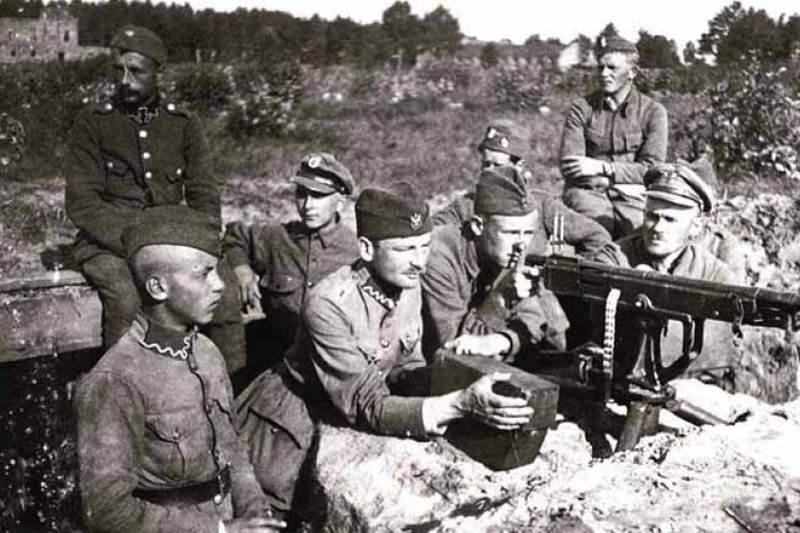World’s 18th Decisive Battle
In the times of worldwide pandemic we are forced to rearrange the scope of valuable celebrations, such as this year’s 100th Anniversary of the Battle of Warsaw in the Polish-Bolshevik War on 15 August 1920, a date which by no coincidence has been also proclaimed as the Armed Forces Day of the Republic of Poland. Today’s humble but solemn celebrations are done in front of two plaques placed in the parish of Saint John Paul II in Bathore in the outskirts of Tirana. The two plaques were placed in the church in Bathore in December 2017 and April 2020 and are devoted to Marshall Jozef Pilsudski and the 100th Anniversary of the Battle of Warsaw.
We are also celebrating Polish Armed Forces Day which was established as a commemoration of the 1920 victory over Soviet Russia at the Battle of Warsaw also known as the “Miracle of the Vistula†during the Polish - Bolshevik War. By no coincidence in these pan demonic times we celebrate in the church the Armed Forces Day which is held in conjunction with the Day of the Assumption of the Virgin Mary, itself a separate religious and public holiday. The "Miracle of the Vistula" is a given name to the Battle of Warsaw during which the Polish Army, under the command of Marshal Jozef Pilsudski successfully pushed back the Red Army offensive outside of the Polish capital in mid-August 1920. The defeat of the Russian army ensured the capital's protection and the survival of the young Second Polish Republic which regained independence in November 1918, after 123 years of nonexistence on the maps of Europe.
At first this holiday was called “Soldiers Day†and in the words of the Polish minister of defense from 1923 was to mark "the memorable defeat of the Bolshevik onslaught in Warsaw and to honor the memory of those killed in battles for Polish independence throughout the ages". Many foreign outstanding figures played their role in the Polish-Bolshevik War. Just to name a few: Apostolic Nuncio Achilles Ratti – later Pope Pius XI; Captain Charles de Gaulle – later President of the Republic of France, who fought in the Polish-Bolshevik War in the army of Polish Gen. Haller; head of American Relief Administration Herbert Hoover – later President of the United States of America; Elisabeth of Bavaria, Queen of Belgium who provided medical aid including sanitary trains and field hospitals to Poland. After World War II, the communist government found it uncomfortable to celebrate the original date of 15 August owing to its glorification of the Red Army's defeat. The religious connotation was also suppressed.
The Battle of Warsaw was fought from August 12–25, 1920, and its outcome secured the Polish state's Eastern frontiers until 17 September 1939. High ranking British diplomat Lord D’Abernon regarded the Battle of Warsaw as one of the most important battles in the history of mankind, since the victory successfully blocked the spread of communism to the rest of Europe - at least for a couple of decades*. Lenin viewed Poland as a bridge to bring communism to Central and Western Europe, and the battle seemed the perfect way to test the Red Army's strength. Bolshevik's speeches asserted that the revolution was to be carried to Western Europe on the bayonets of Russian soldats and that the shortest route to Berlin and Paris runs through Warsaw.
Moscow assumed that the fall of the Polish capital city not only would undermine the morale of the Poles, but spark an international series of communist uprisings and clear the way for the Red Army to join the German revolution. Bolshevik propaganda before the Battle of Warsaw had described the fall of Poland's capital as imminent, and its anticipated defeat was to be a signal for the start of large-scale communist revolutions in Poland, Germany and other European countries, economically devastated by the First World War. As the then Soviet commander Tukhachevsky spoke to his army in July 1920: “Through the corpse of Poland leads the way to the global fire. On our bayonets we will bring peace and happiness to the working masses. Let us march to the West!â€
Due to the Polish victory, however, the plans of a worldwide red revolution had to be canceled. The defeat was a major setback for Lenin who aimed for the revolution to have a global reach. Following the return of democracy in the wake of the events of 1989, and parliamentary semi-free elections of 4 June 1989, which gave communist opposition “Solidarity†Movement a landslide win in both chambers of the parliament, thus triggering the fall of the communist system in the states of Central and Eastern Europe and in 1991 the collapse of the Soviet Union itself, the Polish parliament approved on 30 July 1992 the restoration of the Armed Forces Day to the original 15 August date.
Nowadays the Armed Forces of the Republic of Poland are a strong and reliable member of NATO and a friendly and trustworthy ally of Albania. Ongoing modernization process, participation in peace and stabilization missions in different parts of the world show our nation’s willingness to build a strong army which is able to face current and future challenges. We profoundly trust that during the upcoming years Poland and Albania will be able to determine new platforms of cooperation as well as make military ties between Warsaw and Tirana stronger.
One should conclude with the words of the father of the Polish rebirth in 1918 and the commander in chief of the Warsaw Battle of 1920 Marshall Jozef Pilsudski who stated: “A nation that does not respect its past does not deserve the respect of the present and has no right to the future†– after remembering the past, looking at the present let us turn to the future.
* “The eighteenth decisive battle of the world: Warsaw, 1920â€, by Edgar Vincent, 1st Viscount D'Abernon. Hodder and Stoughton, London, 1931.














